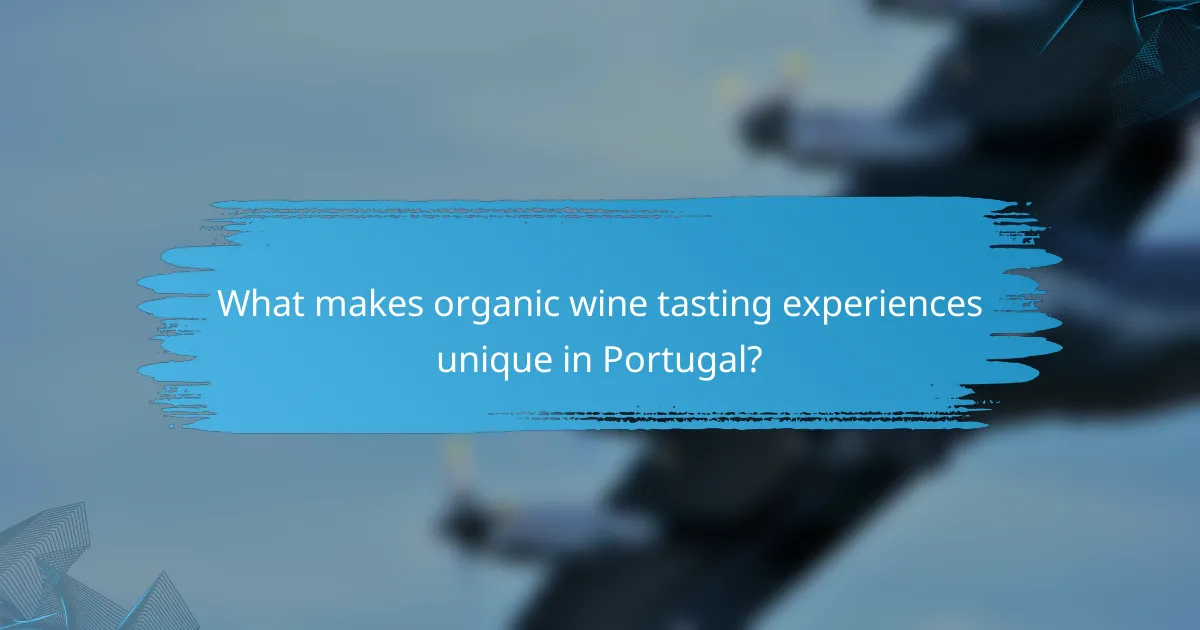Organic wine tasting experiences in Portugal offer unique flavours, health benefits, and breathtaking vineyard views. Discover diverse varietals like Alvarinho and Touriga Nacional. Learn about the health advantages of lower sulfite levels and higher antioxidants. Explore scenic regions such as the Douro Valley, Alentejo, and Dão for memorable tastings.

What makes organic wine tasting experiences unique in Portugal?
Organic wine tasting experiences in Portugal are unique due to their focus on sustainable practices, diverse varietals, and stunning vineyard landscapes. Portugal’s organic wines, such as Alvarinho and Touriga Nacional, offer distinct flavours that reflect the region’s terroir. The health benefits of organic wine, including lower sulfite levels and higher antioxidants, enhance the tasting experience. Scenic vineyards, often located in picturesque regions like the Douro Valley, provide a beautiful backdrop, making each tasting memorable.
Which varietals are most commonly featured in Portuguese organic wines?
The most commonly featured varietals in Portuguese organic wines include Alvarinho, Touriga Nacional, and Baga. These grapes thrive in Portugal’s diverse climates and contribute unique flavours to organic wines. Alvarinho offers crisp acidity and floral notes, while Touriga Nacional provides rich fruitiness and structure. Baga is known for its tannic profile and ageing potential.
How do organic wine tasting experiences differ across regions in Portugal?
Organic wine tasting experiences in Portugal vary significantly by region, influenced by local varietals, climate, and winemaking traditions. The Douro Valley is renowned for its robust red wines, while Alentejo offers smooth, fruit-forward options. The Lisboa region focuses on indigenous varietals, showcasing unique flavours. Health benefits include lower sulfites and higher antioxidants, promoting better digestion and overall wellness. Scenic vineyards enhance the experience, with breathtaking landscapes in the Douro and rolling hills in Alentejo, creating a memorable backdrop for tastings.

What are the health benefits associated with organic wines?
Organic wines offer several health benefits, including lower sulfite levels and higher antioxidant content. They may promote heart health due to compounds like resveratrol, which can improve cardiovascular function. Additionally, organic wines are produced without synthetic pesticides, potentially reducing exposure to harmful chemicals. Many consumers report fewer hangover symptoms after consuming organic varieties, attributed to their cleaner production methods. Overall, choosing organic wines can enhance both the tasting experience and health outcomes.
How do organic wines compare to conventional wines in terms of health?
Organic wines generally have fewer additives and pesticides, making them potentially healthier than conventional wines. Organic wines often contain higher levels of antioxidants, which can benefit heart health. Additionally, the absence of synthetic chemicals may reduce the risk of allergic reactions for some individuals. Overall, choosing organic wines can align with a health-conscious lifestyle, especially when exploring the diverse varietals in Portugal’s scenic vineyards.
What specific compounds in organic wines contribute to health benefits?
Organic wines contain several compounds that contribute to health benefits, including antioxidants like resveratrol, flavonoids, and polyphenols. Resveratrol, found in grape skins, may support heart health and reduce inflammation. Flavonoids offer additional antioxidant properties, potentially lowering the risk of chronic diseases. Polyphenols can enhance gut health and improve metabolic function. These compounds, derived from organic farming practices, often have higher concentrations due to the absence of synthetic pesticides and fertilisers.

Which scenic vineyards are renowned for organic wine tasting in Portugal?
Portugal is renowned for its scenic vineyards that offer exceptional organic wine tasting experiences. Notable locations include the Douro Valley, Alentejo, and Dão regions, each providing unique varietals and stunning landscapes. The Douro Valley features terraced vineyards along the river, while Alentejo showcases vast plains and diverse grape varieties. Dão is known for its cooler climate, producing elegant wines. Visitors can enjoy health benefits associated with organic wines, such as lower sulfite levels and enhanced flavour profiles. Engaging with local winemakers enhances the experience, providing insight into sustainable practices and the art of organic winemaking.
What experiences can visitors expect at top organic vineyards?
Visitors at top organic vineyards in Portugal can expect immersive wine tasting experiences that highlight unique varietals, scenic views, and health benefits. These vineyards often offer guided tours, allowing guests to learn about organic farming practices and the winemaking process.
Tastings typically feature a selection of local wines, emphasizing organic varietals like Alvarinho and Touriga Nacional. Visitors may also enjoy food pairings that enhance the tasting experience, showcasing regional cuisine. Scenic settings, often with picturesque landscapes, create a memorable backdrop for relaxation and enjoyment.
Many vineyards promote the health benefits of organic wines, such as lower sulfite levels and enhanced flavour profiles, appealing to health-conscious consumers. Overall, these experiences combine education, enjoyment, and natural beauty, making visits to organic vineyards in Portugal truly special.
How do vineyard locations enhance the tasting experience?
Vineyard locations significantly enhance the tasting experience by influencing grape quality, flavour profiles, and overall ambiance. Factors such as soil composition, climate, and elevation shape the characteristics of the wine. For example, vineyards in Portugal’s Douro Valley benefit from terraced slopes that optimize sun exposure, resulting in rich, complex varietals. Scenic views and the tranquility of these locations also create a more enjoyable tasting environment, allowing visitors to fully appreciate the nuances of organic wines.

What are the best practices for enjoying an organic wine tasting experience?
To enjoy an organic wine tasting experience in Portugal, focus on selecting the right varietals, appreciating health benefits, and visiting scenic vineyards. Begin by researching local organic wineries known for their unique varietals. Prioritize tastings that highlight the health benefits of organic wines, such as lower sulfite levels and enhanced flavour profiles. Lastly, choose vineyards with picturesque landscapes to enhance the overall experience, making it memorable and enjoyable.
How can visitors prepare for an organic wine tasting in Portugal?
To prepare for an organic wine tasting in Portugal, visitors should focus on research, timing, and attire. Understanding the varietals and regions enhances the experience. Plan visits during harvest season for the best selections. Dress comfortably for vineyard tours, and consider bringing a notebook for tasting notes.
Familiarize yourself with the unique attributes of Portuguese organic wines, such as their sustainable practices and health benefits. Many vineyards offer scenic views, making the experience visually enriching. Booking in advance ensures a spot at popular locations.
What common mistakes should be avoided during organic wine tastings?
To enhance your organic wine tasting experience in Portugal, avoid these common mistakes.
First, neglecting to research the specific varietals can lead to missed opportunities for appreciation. Each grape variety offers unique flavours and aromas that enhance the tasting experience. Second, overlooking the importance of the vineyard setting diminishes the overall enjoyment. Scenic vineyards contribute to the ambiance and connection with the wine’s origin. Third, rushing through the tasting process prevents full engagement with the flavours. Take time to savour each sip and note its characteristics. Lastly, failing to ask questions can limit your understanding of the wine’s story and production methods, which are integral to organic wine tasting.
Which local food pairings enhance organic wine tasting experiences?
Local food pairings that enhance organic wine tasting experiences include traditional Portuguese dishes such as bacalhau à brás, chorizo, and queijo da serra. These foods complement the unique flavours of organic wines. For example, the saltiness of bacalhau balances the acidity in white wines, while chorizo pairs well with robust reds. Additionally, local cheeses enhance the tasting experience by highlighting the wine’s terroir. Enjoying these pairings in scenic vineyards adds to the overall enjoyment and immersion in Portugal’s rich culinary culture.